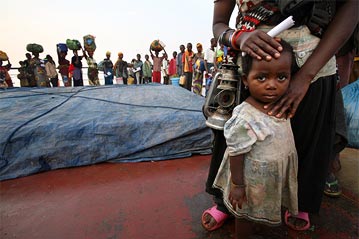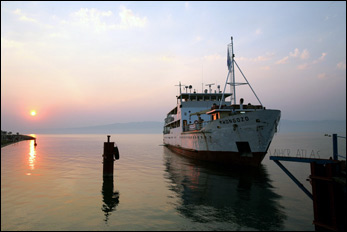Almost 500 Congolese refugees ferried home across Africa's longest lake
Almost 500 Congolese refugees ferried home across Africa's longest lake

BARAKA, Democratic Republic of the Congo, July 7 (UNHCR) - A UNHCR-chartered ferry carrying 488 Congolese refugees crossed Lake Tanganyika and docked here in the Democratic Republic of the Congo (DRC) early Friday. The refugees had boarded the Mwongozo ("Showing the Way") in Kigoma, Tanzania on Thursday and arrived in Baraka, South Kivu province at sunrise.
The rate of returns has been proceeding at a steady pace just weeks ahead of presidential and parliamentary elections in DRC, and Friday's arrivals brought the number of refugees voluntarily repatriated to South Kivu by UNHCR ferry this week to 882.
But Friday's voyage will be the last organised by UNHCR to South Kivu province before the polls, which are currently scheduled to be held on July 30. As a precautionary measure, the UN refugee agency will reduce repatriation activities during the two weeks before the polls and the two weeks after the landmark elections.
The returnees will not be able to vote, but they seemed happy to return despite mounting political instability ahead of the polls. "I am really pleased to be back home," said one old woman, who fled Baraka in 1996.
She spoke in French, but the younger generation of Congolese refugees in Tanzania were brought up speaking English in the anglophone country - a sign of how displacement can cut people off from their cultural and linguistic roots.
The number of people applying for repatriation to South Kivu peaked last year when voter registration was under way in DRC. Congolese refugees in Tanzania wanted to play a part in choosing the future leader of their troubled homeland. They rushed back to register before the process ended last November.
UNHCR explained to the refugees in Tanzania that only those who had registered would be able to vote. "We advised refugees to base their decision on whether to return, not on the timing of the political process in DRC, but on the real conditions in return areas, including security and access to health and education," said Ralf Gruenert, UNHCR deputy representative in DRC.
The arrival of the Mwongozo in Baraka was a heartening sight. While UNHCR staff put landing planks in place, excited returnees shouldered bundles of their few belongings wrapped in colourful cloth. Their enthusiasm reflected an empathy for their country and frustration with camp life, but reintegration in South Kivu will not be easy.
Infrastructure in the province has been shattered by conflict and years of neglect. Patients in many health centres are treated on the floor, while children attend classes in battle-scarred school buildings.
"I came back because life in a refugee camp was difficult. At the same time I worried about food and finding work in Congo," said one returnee in Baraka. "My decision had nothing to do with the electoral process."
UNHCR's return package of kitchen utensils, plastic sheets, blankets, jerry cans and food helps returnees bridge the first three months. All returnee families also receive material to build a shelter.

The refugee agency is facing a substantial funding shortage for programmes aimed at helping returnee communities. It has only received funding to cover some 30 percent of the return and reintegration programme for Congolese returnees.
UNHCR has helped more than 18,000 Congolese refugees return to the DRC provinces of Equateur and South Kivu so far this year, bringing the total number of refugee returns since 2005 to over 65,000. If the elections are peaceful and successful, the number should increase.
By Jens Hesemann in Kinshasa, Democratic Republic of the Congo







